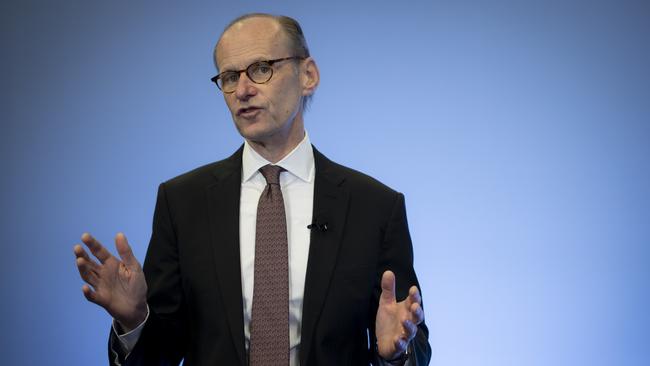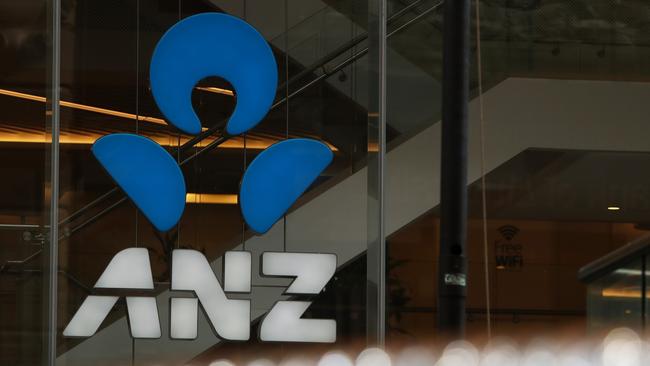Why it’s crunch time for ANZ’s Shayne Elliott
There’s a full slate of career-defining issues coming directly at the ANZ boss. For a CEO heading into his ninth year, it should be much smoother.

No other Australian bank boss has as many risks coming at them as ANZ’s Shayne Elliott heading into the next year.
While newly installed CEOs are usually the ones who tend to face multiple problems, there’s a full slate of career-defining issues coming directly at Elliott. And that’s for a boss heading into his ninth year.
Most pressing, he’s got two different regulators breathing down his neck; then there’s internal culture issues that need to be overhauled, as well as the complex integration of the newly-acquired Suncorp bank. That alone is a big enough job, given it involves bringing thousands of staff and about a million customers over to ANZ.
And Elliott’s biggest risk of all is just about to start. Over the next nine months, he will start to move – albeit very slowly – the first batch of his retail banking customers across to his brand new ANZ-Plus technology platform.
Each of these issues require deft handling.
New customers to the bank have been already signing on to the ANZ-Plus platform (dubbed just Plus internally). Now it’s time to get his 6 million existing ANZ customers and then the Suncorp customers onto the new system and then switch off the old expensive banking platform.

This needs to be done with extreme care to make sure there’s minimal disruption for everyone. That means all the automatic payments, credit cards, loans and everything else plugged into an individual customer’s bank history also move across to the new system.
Technology is one of two top priorities for Elliott heading into next year.
Non-financial risk is the other, with the bank’s trading scandal, that has put workplace culture under the spotlight, as well as claims of overstating market manipulation on a bond trading desk, now subject to an ASIC investigation.
Bank regulator APRA has slapped ANZ with higher capital charges until it can get its cultural fixes right. However, if ASIC uncovers problems that are systemic or bigger than an isolated incident, this has the potential to cost Elliott his job.
Speaking to The Weekend Australian, Elliott says the bond desk issues are “very serious” but don’t represent an “existential crisis” for ANZ.
“We have an issue, and that issue relates to a relatively small group of people in a small part of our bank. I’m not diminishing it. It’s a very serious issue,” he says in an interview, with a slate of cultural programs and a code of conduct review underway. The corporate regulator has said the outcome of its investigation into ANZ should be known by early next year.
“We’re a big, broad bank, and broadly, we are managing the bank really well and delivering well for our customers and our stakeholders.”
Still, Elliott has personally felt the sting of the scandal. His short-term bonus is dropping by $1.1m this year given market issues and non-financial risks have hurt the bank’s reputation, according to annual filings.
“That’s the system at work,” Elliott says. “That’s what’s supposed to happen.”
Tech shock
The bank boss was speaking as ANZ posted an 8 per cent drop in full year cash profit to $6.85bn, excluding the two-month contribution of Suncorp’s earnings. The fall came about because of higher costs and some softness in revenue, while volatile markets income was a big driver of earnings.
ANZ managed to hold its margins steady and lending losses were relatively steady.
For ANZ, the scale of the project of moving customers from one tech system to another represents the equivalent of trying to steer through a major bank merger.
For perspective, Westpac is only now doing this with its St George acquisition, more than a decade-and-a-half after the event. Others like Commonwealth Bank and a reinvigorated NAB will be looking to lure away disgruntled ANZ customers caught up in any hitches.
As ASX’s experience has shown, any technology program, no matter how modest, has the ability to go wrong – and badly.
This means Elliott needs to push ahead with extreme caution and some may argue too slowly, as he gives himself more than three years to move all of his customers over and start switching off the clunky old, but reliable platform.

“We’ll start really, really small – even 1000 or a couple of thousand customers, and see what happens,” he says. However, he says he has confidence in the technology to make the move as seamless as possible and radically limit attrition.
“We’re not Robinson Crusoe in this thing … but there are cases around the world where we can look at and learn from their experience.”
Plus represents one of two tech platforms that Elliott is reshaping his bank of the future around. The other is Transactive Global, designed to be used by mid-sized business customers and up. While the amount of dollars running through Transactive will be high, the absolute number of customers are lower and by nature stickier, so there’s less chance of things going wrong.
$2.5bn bet
And it’s been a big bet by Elliott, who has spent $2.5bn building them both over five years, with the full benefits still years away. This scale and time has sorely tested investor patience, although Elliott argues it was best to get the Suncorp acquisition away before going full scale on Plus.
Still, after five years, ANZ-Plus remains in soft launch mode. There are thousands of engineers working in the background. It needs to get credit cards, term deposits and mortgage broker tools on the platform in the coming year. It’s not yet ready for small businesses to sign up as new customers without the help of staff.

Elliott says there was little choice but to commit to the new platforms. With competition coming at banks from all directions, the only real lever to influence earnings and remain competitive into the future is by controlling costs. Better technology that is cheaper to run, involves less manual processes and has more flexibility built in, is the fastest way to get there, he says.
ANZ-Plus represents a “substantially lower cost platform.”
With some 850,000 mostly new to ANZ customers already using it and $16bn in deposits on the platform, Elliott says the experience already is Plus represents 35 per cent lower cost to serve a customer than the legacy business. As more people move on the platform, costs will come down even further, he says.
“If we can get all our businesses onto Plus – when we get them on there – that gives us an advantage and a buffer to be able to continue to be assertive on home loans.”
After officially getting the keys to Suncorp in August, this will be a driver of retail banking earnings in the future. Although it is the smallest of the big four banks, ANZ now has the second-biggest deposit base in Australia (although there’s a sizeable gap behind market leader CBA). This further helps to lower the cost of funding its lending book.
Elliott says the Suncorp deal helps remove a three-decade structural weakness in retail deposits. He expects savings from the merger to be bigger than first flagged when the deal was announced two years ago. Now that he’s had a chance to have a proper look under the Suncorp hood, the regional bank’s lending book and strength of customer base have passed expectations.
But to see the benefits, Elliott has to get through the next year on his own term.






To join the conversation, please log in. Don't have an account? Register
Join the conversation, you are commenting as Logout